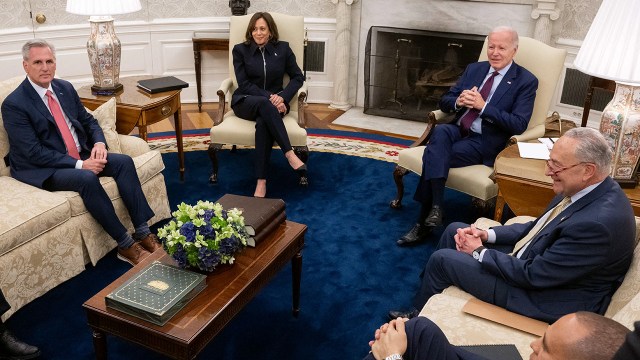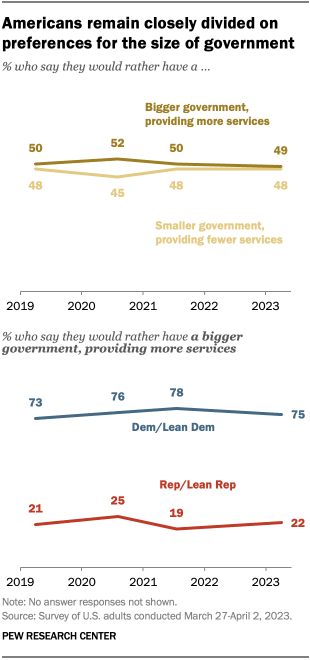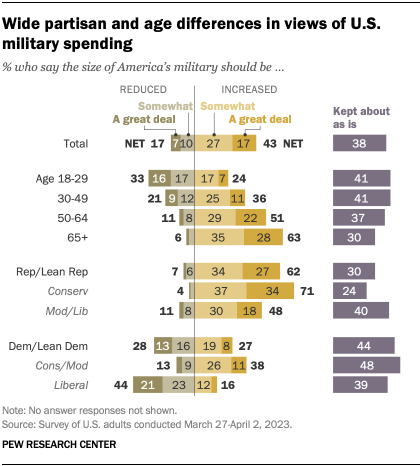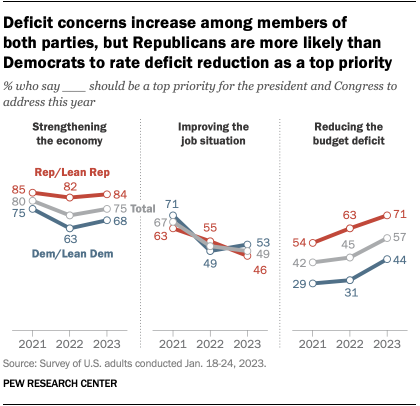
As President Joe Biden and congressional Republicans continue to negotiate on raising the U.S. debt ceiling, the public has nuanced views on related issues such as the preferred size of government, the amount of government assistance to the poor, and the priority of reducing the budget deficit. Here are six facts about Americans’ views of the government, spending and the deficit based on Pew Research Center surveys from this year.
Pew Research Center conducted this analysis to provide insight into the public’s views about the size of government and aspects of government spending and revenue as President Joe Biden and Congress continue negotiations around the debt ceiling. For this analysis, we included data from two surveys in 2023: one with 5,152 U.S. adults conducted Jan. 18-24 and the second with 5,079 U.S. adults conducted March 27-April 2.
Everyone who took part in these surveys is a member of the Center’s American Trends Panel (ATP), an online survey panel that is recruited through national, random sampling of residential addresses. This way nearly all U.S. adults have a chance of selection. The survey is weighted to be representative of the U.S. adult population by gender, race, ethnicity, partisan affiliation, education and other categories. Read more about the ATP’s methodology.
Here is the question from the Jan. 18-24 survey used in this analysis, along with responses, and its methodology. Here are materials for the questions on taxes and government size and role from the March 27-April 2 survey, along with its methodology.

The public remains split on what the government’s size should be. About half of Americans (49%) say they would rather have a bigger government providing more services, while a similar share (48%) would prefer a smaller government providing fewer services, according to a Center survey conducted March 27-April 2. These views have remained relatively stable since 2019. Democrats and Democratic-leaning independents are more than three times as likely as Republicans and Republican leaners to say they would prefer a bigger government (75% vs. 22%).
The public is also divided on the role of government. While 52% say government should be doing more to solve problems, 46% say government is doing too many things that would be better left to businesses and individuals. These attitudes are also deeply divided along partisan lines: While about three-quarters of Democrats (77%) say the government should do more to solve problems, a similar share of Republicans (75%) say the government is doing too many things.

Americans are more likely to want to increase than reduce the size of the U.S. military. About four-in-ten Americans (43%) say that the size of the U.S. military should be increased, compared with 17% who say it should be reduced; 38% say it should be kept about as is. The share of the public saying the military should expand has risen 6 percentage points since July 2021. Currently, military spending makes up about 12% of the overall federal budget but nearly half of so-called discretionary spending, which excludes entitlement programs such as Social Security and Medicare.
Republicans are far more likely than Democrats (62% vs. 27%) to favor increasing the size of the military. There also are age differences: Older adults are more supportive than younger adults when it comes to expanding the size of the military.
More Americans also favor increasing, rather than reducing, government aid to the poor. While 43% favor increasing aid to the poor, 26% say the government should provide less assistance, and 30% say the current level of aid is about right. Democrats are much more likely than Republicans to say the government should provide more assistance to those in need, but Republicans’ views vary by age and income. Younger and lower-income Republicans are more likely than older and higher-income Republicans to say that the government should provide more assistance to those in need.
Majorities favor raising taxes on large companies and high earners. About two-thirds of Americans (65%) say that tax rates on large businesses and corporations should be raised. A somewhat similar share (61%) support raising tax rates on household incomes over $400,000. On both questions, Democrats are much more likely than Republicans to say that tax rates should be increased.

Reducing the budget deficit is a higher priority for the public than it was last year. The share of the public saying that reducing the budget deficit should be a top priority for the president and Congress this year has increased by 12 points since 2022, according to a January 2023 Center survey. Today, 57% say that reducing the budget deficit should be a top priority, compared with 45% in 2022. Both Republicans and Democrats are more likely now than in 2022 to say this should be a top priority, but Republicans are still much more likely to prioritize this than Democrats are (71% vs. 44%).
Note: Here is the question from the Jan. 18-24 survey used in this analysis, along with responses, and its methodology. Here are materials for the questions on taxes and government size and role from the March 27-April 2 survey, along with its methodology.




